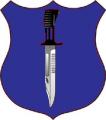three good years out of long term volunteers. Only a very exceptional few would make it for six or ten -- and they'd be worthless for much of anything else afterward. Tours of duty in the US were developed based on WW II experience; long term service in the same jobs and theaters tended to create automatons and maximum risk avoidance, thus the rotation system that was being developed at the end of that war and that reached full swing in Korea and Viet Nam. At least we now rotate units instead of individuals...

Of course, we've been defending Korea for 60 years on that year at a time basis. It is inefficient and it is not totally effective -- but it has been good enough. *
Based on Viet Nam, the number of 'volunteers' for long term stays in the form of multiple and extended tours for the US Army was IIRC about one half of one percent. Not conducive to a major force. Plus most -- not all -- of those folks were not good for much else when they finally did return to the land of the big PX.
The flaw is not in how the force in Afghanistan is established and maintained (nor the current politically induced as opposed to combat fatigue induced risk avoidance syndrome) -- it is in what they have been told to do. When ever one is told to do something that cannot be done, it's problematic. We are not going to reform Afghanistan (or the ME), never were going to do so...

* The difference in Korea is that we were generally smart enough to let the Koreans do their own governing the way they wished,. Amazing the difference in attitude that brings...

Why, Steve, you might even still be in I-rack if that long term volunteer concept were really a good idea...














Bookmarks